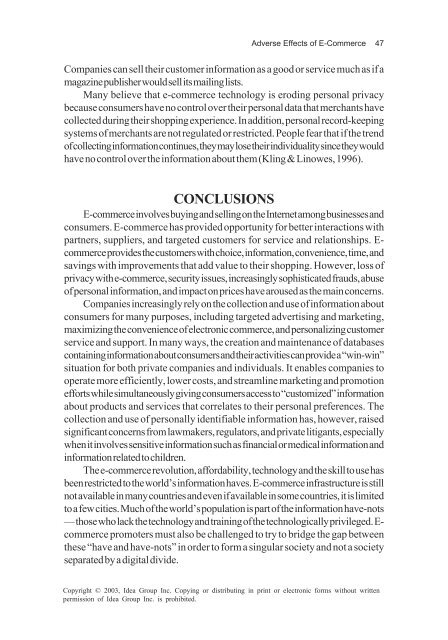www.sharexxx.net - free books & magazines
www.sharexxx.net - free books & magazines
www.sharexxx.net - free books & magazines
You also want an ePaper? Increase the reach of your titles
YUMPU automatically turns print PDFs into web optimized ePapers that Google loves.
Adverse Effects of E-Commerce 47<br />
Companies can sell their customer information as a good or service much as if a<br />
magazine publisher would sell its mailing lists.<br />
Many believe that e-commerce technology is eroding personal privacy<br />
because consumers have no control over their personal data that merchants have<br />
collected during their shopping experience. In addition, personal record-keeping<br />
systems of merchants are not regulated or restricted. People fear that if the trend<br />
of collecting information continues, they may lose their individuality since they would<br />
have no control over the information about them (Kling & Linowes, 1996).<br />
CONCLUSIONS<br />
E-commerce involves buying and selling on the Inter<strong>net</strong> among businesses and<br />
consumers. E-commerce has provided opportunity for better interactions with<br />
partners, suppliers, and targeted customers for service and relationships. Ecommerce<br />
provides the customers with choice, information, convenience, time, and<br />
savings with improvements that add value to their shopping. However, loss of<br />
privacy with e-commerce, security issues, increasingly sophisticated frauds, abuse<br />
of personal information, and impact on prices have aroused as the main concerns.<br />
Companies increasingly rely on the collection and use of information about<br />
consumers for many purposes, including targeted advertising and marketing,<br />
maximizing the convenience of electronic commerce, and personalizing customer<br />
service and support. In many ways, the creation and maintenance of databases<br />
containing information about consumers and their activities can provide a “win-win”<br />
situation for both private companies and individuals. It enables companies to<br />
operate more efficiently, lower costs, and streamline marketing and promotion<br />
efforts while simultaneously giving consumers access to “customized” information<br />
about products and services that correlates to their personal preferences. The<br />
collection and use of personally identifiable information has, however, raised<br />
significant concerns from lawmakers, regulators, and private litigants, especially<br />
when it involves sensitive information such as financial or medical information and<br />
information related to children.<br />
The e-commerce revolution, affordability, technology and the skill to use has<br />
been restricted to the world’s information haves. E-commerce infrastructure is still<br />
not available in many countries and even if available in some countries, it is limited<br />
to a few cities. Much of the world’s population is part of the information have-nots<br />
— those who lack the technology and training of the technologically privileged. Ecommerce<br />
promoters must also be challenged to try to bridge the gap between<br />
these “have and have-nots” in order to form a singular society and not a society<br />
separated by a digital divide.<br />
Copyright © 2003, Idea Group Inc. Copying or distributing in print or electronic forms without written<br />
permission of Idea Group Inc. is prohibited.









